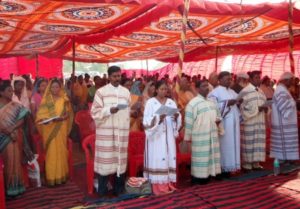
In 2012 we celebrate the 75th anniversary of our first missionary sending. Our newsletter has featured testimonies month-by-month throughout the year, ranging from our earliest years as a missionary community until today.
This month we feature a pair of stories from a pair of our pioneers. You will find an article from Millie Hasselquist (now Tengbom) and the “Nepal Border Fellowship” – precursor to the United Mission to Nepal. Look for another from Billie Wilcox – who with her husband Frank pioneered in Pakistan. Millie is retired and living today in Southern California, with her husband Luverne. Frank passed away some years ago. And dear Billie passed away just a few days ago, in March.
Their testimonies remind me of an image from 3 John.
In this brief epistle, John offers a glimpse of New Testament missionary pioneering. Missionaries traveled about the known world, it seems, planting the church and announcing the Good News of Jesus. John asked his readers to open their homes to these friends – “even though they are strangers to you” (v.5, NIV). “It was for the sake of the Name that they went out,” John reminded them (v.7). We ought to support these sisters and brothers – “that we may be fellow workers in the truth” (v.8, RSV).
Fellow workers in the truth: this is the image I aspire to. I want to stand with Frank and Billie in shared service to God’s good truth. I want to join hands with Ernest and Hildegard in service to the Wonderful News. I want to follow along with Millie, and walk with Dorothy, and Jonathan, and Ray – and all the rest of our company. I want to stand together as synergoi – “fellow workers,” in the language of John – shoulder-to-shoulder, side-by-side, in service to the Truth of the Gospel.
This is an interesting turn of phrase. It is not simply standing together; it is standing and working together in the truth. It is truth that makes “fellow workers” possible. The truth of the Gospel creates the fellow workers, in fact, and binds them together in the Body and the Mission of Christ. Truth sets their path. Truth makes them who they are.
The Apostle John was crazy about truth; his Gospel and Epistles are full of it. The Word became flesh “full of grace and truth” (John 1:14). “For the law was given through Moses; grace and truth came through Jesus Christ” (John 1:17). Jesus himself was truth incarnate: “I am… the truth,” he proclaimed (John 14:6).
The truth makes us free (John 8:32). The truth makes us holy (John 17:17). The truth guides our worship (John 4:24). The truth illumines our path (2 John 1:4). We are to love in truth (1 John 3:18). We are to know the truth (1 John 2:21). And in John’s third epistle, we are invited to stand with the apostolic company – the pioneers who tell the Good News where it has not been told before – as “fellow workers in the truth” (v.8).
Truth, unfortunately, has gotten a bad reputation in our modern West. In the words of the great Lesslie Newbigin, churches in the modern West have come down with a case of “chronic bad conscience” so that we fear “above everything else the charge of arrogance.” “A profound crisis of faith within the Western Churches has led to a loss of conviction that there is anything in the Christian faith that is so vital that without it [men and women] will perish.”?[1] We are consummate relativists. We write our “truth” always in the lower case, and with caveat and apology. But Truth incarnate – Truth so vital that without it we die – this seems to the modern West quite over the top.
But it was not over the top for John, or for Frank and Billie. They do not, you see, presume arrogantly to own the truth: they are owned by it. They do not pretend arrogantly some corner on the truth: the truth has cornered them. They have met the One who is “the way, and the truth, and the life” (John 14:6). And he has become the vital center of their lives.
Once again, Lesslie Newbigin: “The relativism which is not willing to speak about truth but only about ‘what is true for me’ is an evasion of the serious business of living. It is the mark of a tragic loss of nerve in our contemporary culture. It is a preliminary symptom of death.”?[2]
A symptom of living, on the other hand, is to walk in the truth of the Gospel of Jesus Christ – crucified, risen, and coming again, the Hope of the world. And walking by faith along this path, we are given a task. We are made into a Kingdom. By God’s good grace and truth, we are made his “fellow workers.”
2 The Gospel in a Pluralist Society. (Grand Rapids: Eerdmans, 1989), p.22